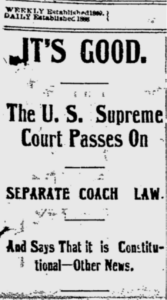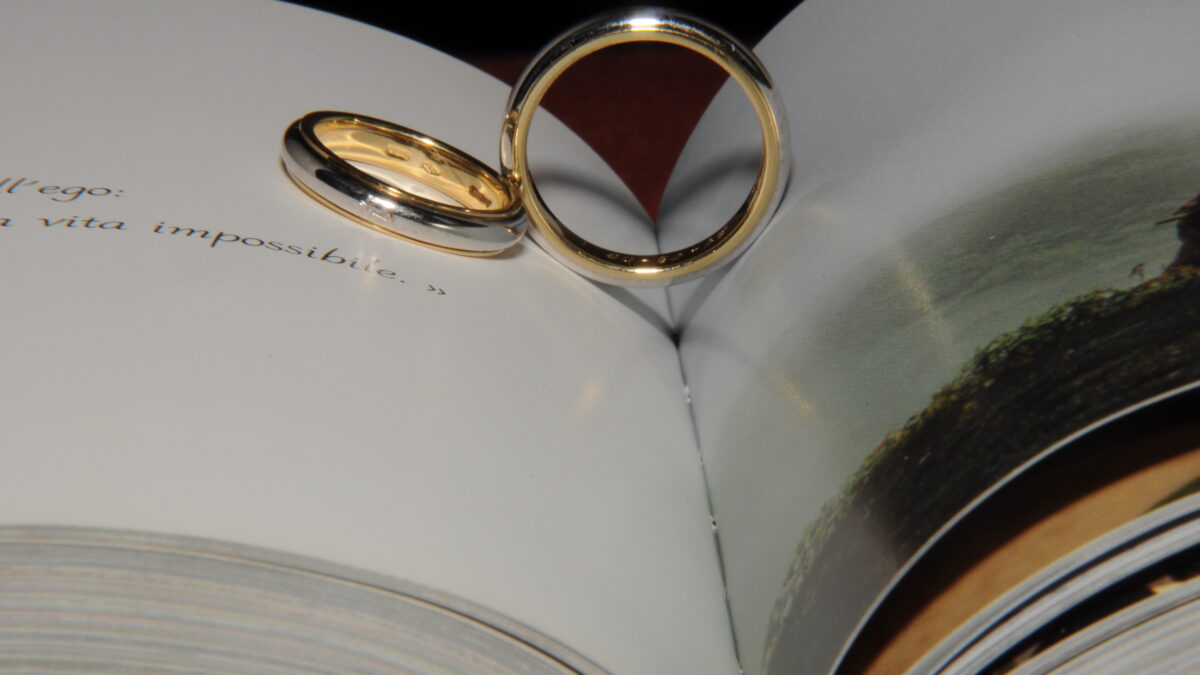In the Daily Kentucky New Era newspaper the day after the Plessy v. Ferguson decision, the top left corner of the front page read only: “IT’S GOOD. — The U.S. Supreme Court Passes On — SEPARATE COACH LAW. — And Says That it is Constitutional — Other News.” That was it for the Kentucky paper on “separate but equal,” a court decision that was supposed, wrongly, to settle key questions of civil rights, constitutional law, and race relations in America. The New Era barely batted an eye at the decision.

The lesson for anyone with more than a gnat’s eye view of history is that a given moment can seem uneventful or even positive if you mistake the time, the issue, and the nature of things. The lesson for politicians is even clearer. Take care wading into deep waters of civil and natural rights, because the truth will come to light eventually, as it did with “separate but equal,” as it did with the journey from Roe to Dobbs. It often takes time to think, argue, and discuss, and frankly, it often takes errors to compare with good policy before the American people can decide properly what to do about a given difficult issue such as civil rights, abortion, or marriage, which has now become yet another deep societal debate, only in its infancy of consideration after Obergefell.
Now the Supreme Court has a long history of getting out over its skis, so to speak, and of attempting to settle such complex issues with decisions such as Dred Scott, Plessy, Roe, and Obergefell. It is a kind of oligarchic temptation to which the court has repeatedly succumbed. And it has been an error somewhat particular to the Supreme Court — until now.
It seems that the Senate — and, by its leadership, the whole of the Democrat-controlled Congress — is about to join the court in that same downhill slalom to the dustbin of history if they pass the unrealistically named Respect for Marriage Act this very afternoon. Unless the Respect for Marriage Act is voted down, the Senate will attempt to second the haste of the court’s Obergefell decision by trying to codify gay marriage, which looks, as Plessy did to the headline writers of the Daily Kentucky New Era in May of 1896, like an uncontroversial bill.
Senators who think they will be hailed as champions and protectors of so-called marriage equality may have a somewhat narrow view of history because they woefully underestimate the power of what the Declaration of Independence called a candid world that can come to understand certain self-evident truths about Nature and Nature’s God if given the time to hear out the arguments, test the ideas, and consider seriously whether something is truly a right.
Now, this is precisely what the Senate minority and its leadership are meant to do. They are, by constitutional design and by the blessings of the filibuster, able to stop the majority from committing the sort of hasty errors we’ve come to expect now and again from the court and — let’s be honest — from the House, a body designed to be more energetic and younger in contrast to the Senate’s age and discretion. But so far, it seems the Republican minority party in the Senate is not showing the sort of caution it should on such a momentous issue. It is one that concerns marriage, sexual complementarity, human nature, the rights of children, and what the Founding Fathers repeatedly called the nursery of the republic, namely the natural family, or what was called simply the family until basically 2009.
By offering their votes to break the filibuster and pass this wayward bill, 12 Republicans seem poised to make a terrible mistake and leap feet first into the mire of this long-term societal argument about marriage — recall Roe to Dobbs took nearly 50 years of argument and political action. These Republicans, The Unsuspecting 12, may think they are securing a good, but their short-sighted view of this long debate, one the world has had repeatedly over the millennia concerning the nature of marriage, will put them on a list of infamous characters who thought they were on the right side of history.
For the record, these 12 are Sens. Roy Blunt of Missouri, Richard Burr and Thom Tillis of North Carolina, Shelley Moore Capito of West Virginia, Susan Collins of Maine, Joni Ernst of Iowa, Cynthia Lummis of Wyoming, Lisa Murkowski of Alaska, Rob Portman of Ohio, Mitt Romney of Utah, Dan Sullivan of Alaska, and Todd Young of Indiana.
But if this epochal disaster of a bill goes through this afternoon, with the assistance of these 12, the number would have to increase by one to unlucky number 13. For Sen. Mitch McConnell would have sat by and allowed something I have never seen him allow in his career — namely to allow both his party and his congressional body to leap hastily into a profound debate still to be played out and thereby become the unwitting opponent of a grand, long-term effort, only just begun, to defend natural marriage and that engine of human flourishing, that nursery of the republic, the natural family.
For The Unsuspecting 12 to become The Hapless 13 in this way would be unlucky indeed — unlucky for Republicans, unlucky for the Senate, unlucky for the peace and prosperity of the country in both the short and the long term. But then again, the vote is yet to be made, so perhaps wise leadership and not dumb luck will stop the Senate from risking its reputation as the more considerate constitutional body.









